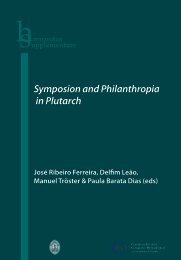Hipólito e Fedra nos caminhos de um mito - Universidade de Coimbra
Hipólito e Fedra nos caminhos de um mito - Universidade de Coimbra
Hipólito e Fedra nos caminhos de um mito - Universidade de Coimbra
You also want an ePaper? Increase the reach of your titles
YUMPU automatically turns print PDFs into web optimized ePapers that Google loves.
212<br />
VIII. [http://champpenal.revues.org/8046].<br />
J. Glenn (1976), “The fantasies of Phaedra: a psychoanalytic reading”, Classical<br />
World 69.7: 435-442.<br />
A. Gold, R. Fizdale (1991), The Divine Sarah: A Life of Sarah Bernhardt. New<br />
York.<br />
L. Goldmann (1976), Le Dieu caché: étu<strong>de</strong> sur la vision tragique dans les Pensées<br />
<strong>de</strong> Pascal et les tragédies <strong>de</strong> Racine. Paris.<br />
B. E. Goof (1990), The noose of words, readings of <strong>de</strong>sire, violence & language in<br />
Euripi<strong>de</strong>s’ Hippolytos. Cambridge.<br />
P. Grimal (1963), “L´originalité <strong>de</strong> Sénèque dans la tragédie <strong>de</strong> Phèdre”,<br />
REL 41: 297-314.<br />
J. Grotowski (1987), Em busca <strong>de</strong> <strong>um</strong> teatro pobre. Trad. Aldomar Conrado.<br />
Rio <strong>de</strong> Janeiro.<br />
——— (2007), “Em busca <strong>de</strong> <strong>um</strong> teatro pobre”, in L. Flaszen, C. Pollastrelli<br />
(org.), O Teatro Laboratório <strong>de</strong> Jerzy Grotowski 1959-1969. Trad. Renata<br />
Molinari. São Paulo.<br />
R. Gullón (1980), “Relectura <strong>de</strong> San Manuel Bueno”, in F. Rico, Historia y<br />
Crítica <strong>de</strong> la Literatura Española. Mo<strong>de</strong>rnismo y 98. Tomo 6. Barcelona.<br />
M. Hartman (1961), “Desire un<strong>de</strong>r the Elms: in the light of Strindberg’s<br />
influence”, American Literature 33.3: 360-369.<br />
D. Heartz, J. A. Rice edd. (2004), From Garrick to Gluck: essays on opera in the<br />
age of Enlightenment. Pendragon, Hillsdale, New York.<br />
K. Heldmann (1968), “Senecas Phaedra und ihre griechischen Vorbil<strong>de</strong>r”,<br />
Hermes 96: 88-117.<br />
W. Heller (2010), “Phaedra’s Handmai<strong>de</strong>n: tragedy as comedy and spectacle<br />
in seventeenth-century opera”, in P. Brown, S. Ograjenšek (eds.), Ancient<br />
Drama in Music for the Mo<strong>de</strong>rn Stage. Oxford: 67-84.<br />
H. Erbse (1984), Studien z<strong>um</strong> Prolog <strong>de</strong>r Euripi<strong>de</strong>ischen Tragödie. Berlin.<br />
H. Herter (1971), “Phaidra in griechischer und romischer Gestalt”,<br />
Rheinisches Muse<strong>um</strong> für Philologie 114: 51-104.<br />
M. Hose (1990), Studien z<strong>um</strong> Chor bei Euripi<strong>de</strong>s I. Stuttgart.<br />
B. Hoxby (2005), “The doleful airs of Euripi<strong>de</strong>s: the origins of opera and<br />
the spirit of tragedy reconsi<strong>de</strong>red”, in Cambridge Opera Journal 17.3:<br />
253–269.<br />
——— (2007), “All Passion Spent: the means and ends of a Tragédie en<br />
Musique”, in Comparative literature 59.1: 33-62.

















